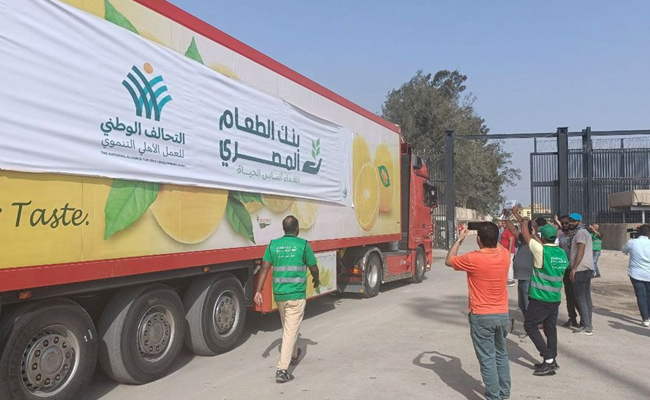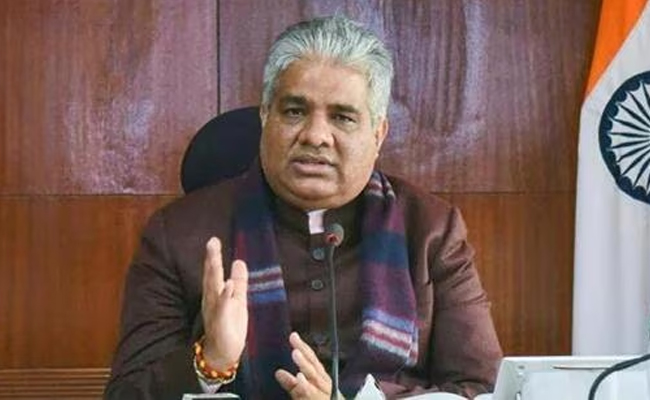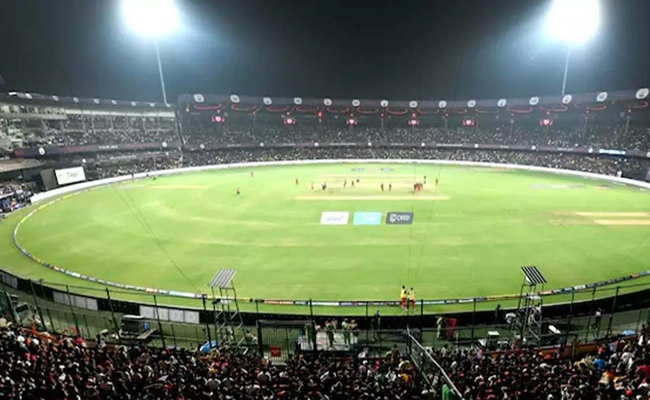Rafah (Gaza Strip) (AP/PTI): The second aid convoy destined for desperate Palestinian civilians reached Gaza on Sunday, as Israel widened its attacks to include targets in Syria and the occupied West Bank and the Israeli prime minister warned Lebanon's Hezbollah group that if it launches its own war, "we will cripple it with a force it cannot even imagine."
For days, Israel has been on the verge of launching a ground offensive in Gaza. Tanks and troops have been massed at the Gaza border, waiting for the command to cross.
Israel's military spokesman, Rear Adm. Daniel Hagari, said the country had increased airstrikes across Gaza to hit targets that would reduce the risk to troops in the next stage of the war.
Fears of a widening war grew as Israeli warplanes struck targets across Gaza, two airports in Syria and a mosque in the occupied West Bank allegedly used by militants.
Prime Minister Benjamin Netanyahu told troops in northern Israel that if Hezbollah launches a war, "it will make the mistake of its life. We will cripple it with a force it cannot even imagine, and the consequences for it and the Lebanese state will be devastating."
Hamas said it fought with Israeli forces near Khan Younis in southern Gaza and destroyed a tank and two bulldozers.
Late Sunday, Hagari announced that a soldier was killed and three others wounded by an anti-tank missile during a raid inside Gaza as part of efforts to rescue more than 200 hostages abducted in the October 7 attack.
On Saturday, 20 trucks entered Gaza in the first aid shipment into the territory since Israel imposed a complete siege two weeks ago.
Israeli authorities said late Sunday they had allowed a second batch of aid into Gaza at the request of the United States. COGAT, the Israeli defense body responsible for Palestinian civilian affairs, said the aid included water, food and medical supplies and that everything was inspected by Israel before it was brought into Gaza.
The UN agency for Palestinian refugees confirmed the arrival of 14 trucks.
Israel has not allowed any fuel to enter Gaza.
In a sign of how precarious any movement of aid remains, the Egyptian military said Israeli shelling hit a watchtower on Egypt's side of the border, causing light injuries. The Israeli military apologized, saying a tank had accidentally fired and hit an Egyptian post, and the incident was being investigated.
Relief workers said far more aid was needed to address the spiralling humanitarian crisis in Gaza, where half the territory's 2.3 million people have fled their homes. The UN humanitarian agency said Saturday's convoy carried about 4 per cent of an average day's imports before the war and "a fraction of what is needed after 13 days of complete siege."
The Israeli military said the humanitarian situation was "under control," even as the UN called for 100 trucks a day to enter.
Israel repeated its calls for people to leave northern Gaza, including by dropping leaflets from the air. It estimated 700,000 have already fled. But hundreds of thousands remain. That would raise the risk of mass civilian casualties in any ground offensive.
Israeli military officials say Hamas' infrastructure and underground tunnels are concentrated in Gaza City, in the north, and that the next stage of the offensive will include unprecedented force there. Israel says it wants to crush Hamas. Officials have also spoken of carving out a buffer zone to keep Palestinians from approaching the border, though they have given no details.
Hospitals packed with patients and displaced people are running low on medical supplies and fuel for generators, forcing doctors to perform surgeries using sewing needles, resorting to vinegar as disinfectant and operating without anesthesia.
The World Health Organisation says at least 130 premature babies are at "grave risk" because of a shortage of generator fuel. It said seven hospitals in northern Gaza have been forced to shut down due to damage from strikes, lack of power and supplies, or Israeli evacuation orders.
Shortages of critical supplies, including ventilators, are forcing doctors to ration treatment, said Dr. Mohammed Qandeel, who works in Khan Younis' Nasser Hospital. Dozens of patients continue to arrive and are treated in crowded, darkened corridors, as hospitals preserve electricity for intensive care units.
"It's heartbreaking," Qandeel said.
Palestinians sheltering in UN-run schools and tent camps are running low on food and are drinking dirty water. The lack of fuel has crippled water and sanitation systems.
Let the Truth be known. If you read VB and like VB, please be a VB Supporter and Help us deliver the Truth to one and all.
Thrissur (Kerala) (PTI): A man was arrested on Monday after a 14-year-old boy was killed when a car overturned during a stunt-driving incident at Chamakala Rajiv Road beach in Chentrappinni here, police said.
The arrested accused was identified as Shajeer alias Saddam (36), a native of Kurikkuzhi in Kaipamangalam.
According to police, the incident occurred around 6 pm on Sunday when the accused allegedly performed dangerous drifting manoeuvres with an open-top Gypsy vehicle at the beach, without following any safety norms.
The accused picked up three minors — Mohammed Sinan (14), Mohammed Shafeer (14) and Ameer (12) — who were playing at the beach, and made them sit at the rear of the vehicle before driving recklessly.
While performing the drifting stunt, the vehicle went out of control and overturned, trapping Sinan underneath.
He suffered severe head injuries and succumbed to the impact, police said.
Based on a complaint, Kaipamangalam police registered a case under Section 105 (culpable homicide) of the Bharatiya Nyaya Sanhita.
After completing the preliminary probe, police arrested Shajeer on Monday.
He was later produced before a court and remanded to judicial custody, police said.
The accused is involved in 11 criminal cases.





